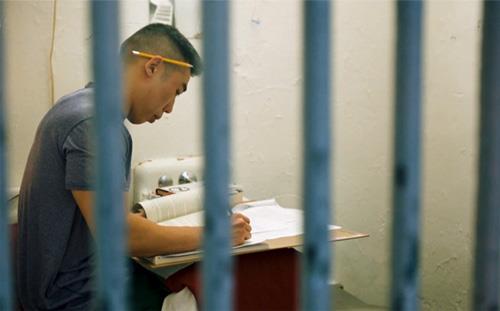
Up until 20 or 30 years ago, education was considered a standard component in prison rehabilitation programs.
The idea was that a prisoner who left with more skills than he or she previously possessed was more likely to land legitimate work after completing his or her sentence. Instead of, say, going back to crime and eventually back to prison.
Then the pendulum swung, and politicians from both parties began switching to the counterargument that giving prisoners a free college-level education was rewarding the behavior.
College Behind Bars, a four-hour documentary that focuses on a small, vestigial education program that survives in New York prisons today, argues strongly that our more generous instinct was also the right one.
College Behind Bars, which premieres Monday at 9 p.m. ET on PBS (check local listings), and will air for two hours Monday and Tuesday nights, was produced by Lynn Novick, best known as Ken Burns' documentary collaborator.
Since College Behind Bars is more contemporary than historical, it focuses on prisoners who are enrolled in these programs today. Corrections professionals explain the value of the programs not just to participants, but to the larger society, which ends up with more productive citizens and fewer criminals.
College Behind Bars does not shy away from having inmates discuss the crimes that put them behind bars in the first place. These segments, directly or by implication, argue for rehabilitation and even its more elusive cousin, redemption.
The footage of the classes themselves is striking. Many of the students still look and sound street-tough, only instead of coming off as the bad guys from a Law & Order episode, they're discussing Plato and Aristotle, or learning algebraic equations and how to speak Chinese.
The instructors, volunteers from schools up to the level of the Ivies and MIT, tell Novick's team that in some ways, the prison students are easier to teach than their civilian classes, because they keep up with their assignments, participate and want to learn.
The students consistently describe their own early education as a dysfunctional dead end, from which they fell away and drifted into gangs and crime.
Prison life, they say, has proven that choice to be a bad one. They describe a numbing and depressing routine that nurtures the worst social traits while giving inmates no tools except fear with which to live differently when they return to outside society.
Critics of prison education programs reply here that, of course, prison is a bad place. That's what it should be. It's punishment for misdeeds, not a vehicle for personal growth.
Critics might also argue that the subjects of Novick's documentary constitute a select minority of prison inmates.
They are enrolled in New York's Bard Prison Initiative (BPI), which is funded through private donations since government support was eliminated. College Behind Bars says that of the approximately 53,400 inmates in New York prisons, about 950 have access to programs like this.
That is to say, the fact these subjects seem strongly motivated and determined to turn their outside lives around does not necessarily mean all inmates have equal motivation or would find the same potential benefits. Others, very likely, would say Moby Dick has nothing to with their lives or their world.
The College Behind Bars response might best be summarized in a brief clip where New York Gov. Andrew Cuomo points out that inmates who complete education courses have about a 4% recidivism rate – compared to about 50% for the prison population as a whole.
That would seem to be a compelling argument.
But it was not compelling enough, even in a relatively progressive state like New York, for Cuomo to stick with his proposal to start funding prison education programs again. Six weeks after he announced it, opposition led him to withdraw it.
College Behind Bars suggests that every metric supports the programs, from basic humanity to the practical value of decreasing the number of prisoners who see their only future option as turning back to crime.
It also adds, in a strong parenthesis, that an education program does not turn prison into living large. It's still a prison with all the restrictions, challenges, and dangers that entails. The myth that a prisoner in an education program feels rewarded rather than punished ignores the fact that no matter how many psychology tests that prisoner aces, he or she still gets locked in a cell every night.
In the end, Novick makes a strong case that what has been derided by critics as "coddling" prisoners can, over the long term, lead to fewer prisoners. BPI won't save everyone, but if it saves dozens, or hundreds, or thousands, it makes the world safer for everyone else.